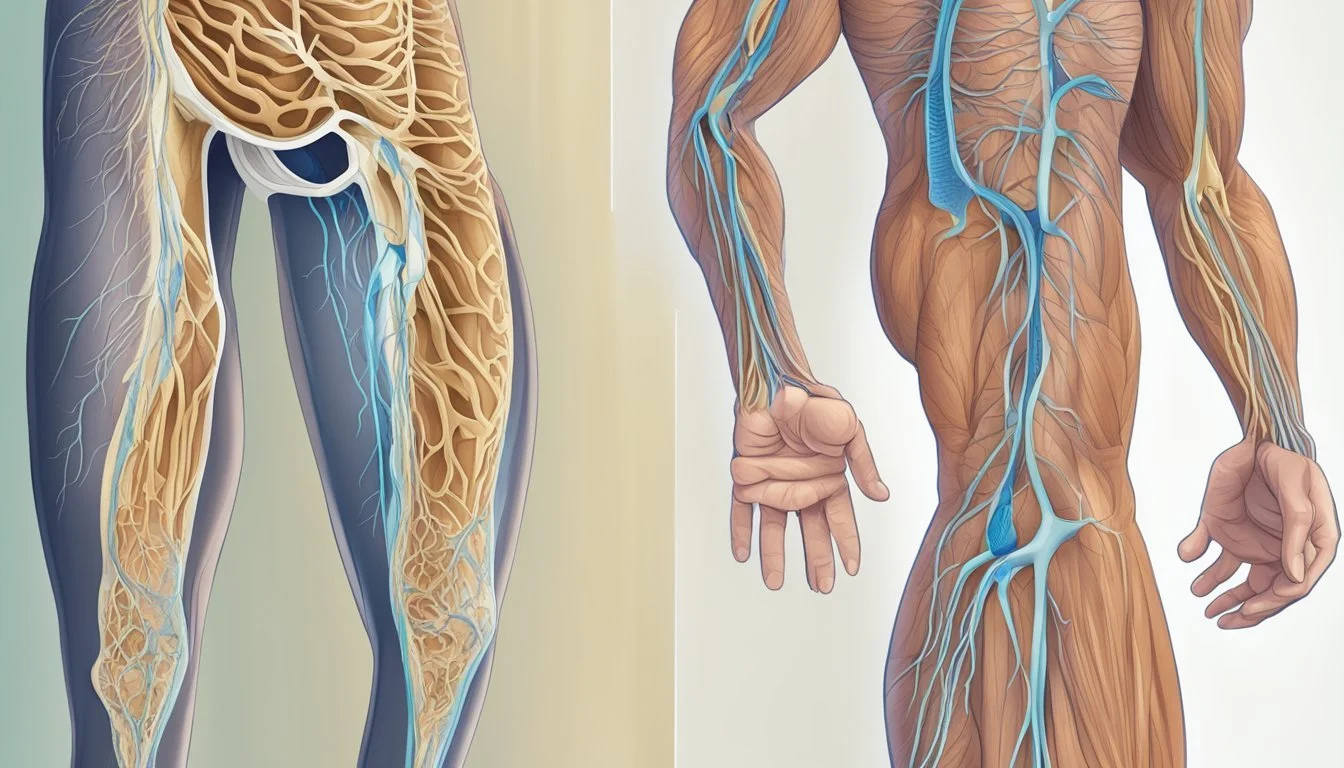Keto Diet and Varicose Veins
Exploring the Connection
The ketogenic diet, frequently referred to as keto, has gained notoriety not just for its potential to aid in weight loss but also for its supposed health benefits. One such claimed benefit pertains to varicose veins, a condition characterized by swollen, twisted veins that often appear on the legs due to weakened valves and vein walls. While many treatments for varicose veins exist, ranging from compression therapy to surgical procedures, some suggest that dietary choices can influence their development and progression.
The foundation of the keto diet lies in its high-fat, moderate protein, and very low carbohydrate composition, which shifts the body's energy utilization from glucose to ketones, byproducts of fat metabolism. Advocates argue that by reducing carbohydrate intake, the body may better manage inflammation and improve circulation, which could potentially alleviate the symptoms associated with varicose veins. Additionally, weight loss associated with the keto diet could decrease the pressure on leg veins, further reducing the risk of varicose veins or the discomfort they cause.
While research directly linking the keto diet to the treatment or prevention of varicose veins is limited, nutritionists suggest a diet low in carbs and rich in high-fiber foods, such as leafy greens, could support vascular health. Adequate hydration, another key aspect of a healthy diet, remains essential for maintaining good blood flow and vein function. As with any nutritional intervention, individuals should consider their overall health and consult with healthcare professionals to determine if the keto diet aligns with their health goals, especially when addressing concerns like varicose veins.
Understanding Varicose Veins
In exploring the relationship between dietary choices, like the keto diet, and vein health, it's essential to understand what varicose veins are, their symptoms and signs, and the underlying causes and risk factors.
Definition and Types
Varicose veins are engorged and twisted blood vessels that primarily develop in the legs. They differ from spider veins, which are smaller, web-like networks of veins that are less prominent and typically do not bulge above the skin's surface. Varicose veins, on the other hand, are larger, swollen, and can be visually unappealing and physically uncomfortable.
Symptoms and Signs
The symptoms of varicose veins include:
Aching, heavy feeling in legs
Burning, throbbing, or cramping muscles, especially at night
Itching around veins
Pain worsening after prolonged sitting or standing
Over time, severe symptoms might develop such as skin ulcers near the ankle, signifying a severe vascular disease that requires medical evaluation.
Causes and Risk Factors
Varicose veins occur due to faulty valves in the veins which fail to regulate blood flow properly, leading to accumulation and increased blood pressure within the veins. Several risk factors contribute to their development:
Age: Efficiency of vein valves decreases with age, leading to varicose veins.
Sex: Women are more likely than men to develop varicose veins due to hormonal fluctuations.
Obesity: Carrying excess weight puts additional pressure on veins.
Sedentary lifestyle: Lack of movement can affect circulation and vein health.
Genetics: Family history can predispose individuals to vein issues.
Key Principles of the Keto Diet
The ketogenic diet is a dietary approach that significantly alters macronutrient intake to stimulate a metabolic state known as ketosis, primarily through high fat and low carbohydrate consumption.
What is Ketosis?
Ketosis is a metabolic state where the body utilizes fats rather than carbohydrates as its main energy source. This is achieved when carbohydrate intake is drastically reduced, prompting the liver to convert fats into ketone bodies. Ketones then serve as an alternative energy source for various tissues, including the brain.
Types of Ketogenic Diets
There are several variations of the ketogenic diet, each with specific macronutrient ratios:
Standard Ketogenic Diet (SKD): This type typically consists of about 70% fat, 20% protein, and only 10% carbohydrates.
Cyclical Ketogenic Diet (CKD): CKD involves periods of higher-carb refeeds, such as 5 ketogenic days followed by 2 high-carb days.
Targeted Ketogenic Diet (TKD): TKD allows for additional carbs around workouts.
High-Protein Ketogenic Diet: Similar to SKD, but includes more protein, typically 60% fat, 35% protein, and 5% carbs.
Nutrient Composition
The ketogenic diet emphasizes the following macronutrient composition:
Fats: The primary source of calories, making up a substantial portion of the diet. Healthy fats like avocados, coconut oil, butter, nuts, and seeds are encouraged.
Protein: Consumed in moderation, protein intake should be sufficient to maintain muscle mass without disrupting ketosis.
Low Carb: Intake of carbohydrates is drastically minimized to maintain ketosis. Most carbohydrates in a keto diet come from non-starchy vegetables and nuts.
The Impact of Keto Diet on Metabolic Health
The ketogenic diet, often referred to as keto, is a high-fat, low-carbohydrate eating plan that has been associated with significant weight loss and improvements in metabolic syndrome.
Keto Diet and Weight Loss
Weight Loss: Individuals following the keto diet typically experience weight loss due to a decrease in carbohydrate intake and an increase in metabolism of fats. Metabolic Health: The diet can induce a state of ketosis, where the body utilizes fat as a primary energy source, often leading to a reduction in body weight for those overweight.
Impact on Liver: The liver starts converting fat into ketones, which serve as an alternate energy source, potentially improving liver health.
Blood Sugar Regulation: By limiting carbs, the keto diet can help stabilize blood sugar levels, improving insulin sensitivity in individuals with type 2 diabetes.
Keto Diet and Metabolic Syndrome
Metabolic Syndrome: This syndrome is a cluster of conditions, including high blood pressure, high blood sugar, excess body fat around the waist, and abnormal cholesterol levels. The keto diet may improve these markers due to its macronutrient distribution.
Insulin Sensitivity: The diet lowers carbohydrate intake which can enhance insulin sensitivity and lower blood sugar levels, critical for managing metabolic syndrome and type 2 diabetes.
Effect on Metabolism: The metabolic shift to utilizing fatty acids and ketones for energy may influence overall metabolism, possibly improving metabolic health in individuals with metabolic syndrome.
Nutritional Considerations for Varicose Veins
Managing varicose veins can often begin with dietary modifications. Both nutrients and certain dietary patterns play a critical role in vein health by influencing inflammation, blood flow, and overall vascular integrity.
Recommended Dietary Changes
Hydration
Adequate hydration is essential for maintaining the health of veins, as it can help improve blood flow and prevent blood from thickening. Adults are typically recommended to drink at least half a gallon of water per day.
Fiber Intake
Dietary fiber is crucial for preventing constipation, a contributing factor to varicose veins, as it can increase pressure on the venous system. A high-fiber diet includes:
Whole grains
Legumes
Nuts and seeds
Fruits and vegetables
Vitamins and Antioxidants
A nutrient-rich diet high in vitamins C and E, as well as other antioxidants, can strengthen the walls of blood vessels. These are abundantly found in:
Citrus fruits
Berries
Green leafy vegetables
Nuts and seeds
Flavonoids
Consuming flavonoids, which improve blood circulation and reduce the likelihood of blood pooling in the veins, can be beneficial. Foods rich in flavonoids include:
Apples
Grapes
Onions
Garlic
Dark chocolate
Foods to Avoid
Salt
Excessive intake of salt can lead to water retention, which might exacerbate varicose veins. Processed foods often have high sodium content and should be consumed in moderation.
Processed Meats
Processed meats are typically high in sodium and preservatives, potentially affecting vein health. They can be replaced with leaner protein sources such as fish or poultry.
Alcohol
Alcohol consumption can lead to dilated blood vessels and increase the risk of varicose veins. Limiting alcohol intake can help manage the condition.
By focusing on these nutritional considerations, individuals may help manage and reduce the symptoms of varicose veins. Diet plays a role not only in overall health but also in the health of the circulatory system, which includes the veins.
Lifestyle and Dietary Adjustments
Modifications in lifestyle and diet are essential for individuals managing varicose veins. Emphasis is placed on physical activity and proper nutrition to aid weight management and improve blood circulation.
Exercise and Physical Activity
Engaging in regular exercise can promote better blood circulation and reduce the pressure on veins. Low-impact activities such as walking, swimming, or cycling are particularly beneficial for those with varicose veins, as they help to pump blood back to the heart without excessive stress on the veins. It is crucial to avoid long periods of standing or sitting, as these can exacerbate the condition.
Effects of Obesity and Weight Management
Obesity is a significant risk factor for varicose veins due to the increased pressure it places on the circulatory system. Managing body weight through a ketogenic diet may help lessen this pressure and thus reduce the risk or seriousness of varicose veins. A ketogenic diet, low in carbohydrates and high in healthy fats, can contribute to weight loss and decrease in body fat, which in turn can alleviate stress on the veins and improve overall vein health. However, individuals should ensure that their diet is balanced and that they receive adequate nutrition, as extremes in diet can have unseen repercussions on cardiovascular health.
Treatment Options for Varicose Veins
Varicose veins, typically manifesting as swollen and twisted veins, often lead to pain and discomfort. Various treatment methods are available to alleviate symptoms and improve vein appearance, ranging from medical interventions to natural approaches.
Conventional Medical Treatments
Compression Stockings: Wearing compression stockings continuously throughout the day is a conventional starting point for treating the discomfort associated with varicose veins. These stockings apply gradual pressure to the legs, improving circulation and reducing swelling and pain.
Sclerotherapy: This procedure involves injecting a sclerosing agent directly into the small and medium-sized varicose veins, causing them to collapse and fade. Sclerotherapy can reduce aching and discomfort, and typically, several treatments are necessary for optimal results.
Ambulatory Phlebectomy: This minimally invasive surgical technique removes superficial veins through small incisions in the skin. It's often employed for larger varicose veins to alleviate symptoms of pain and promote cosmetic improvement.
Endovenous Thermal Ablation: Techniques such as Endovenous Laser Treatment (EVLT) and Radiofrequency Ablation (RFA) are advanced options that close off varicose veins. They use heat generated by laser or radiofrequency energy to seal the problematic veins, thus reducing the pain and appearance of varicose veins.
Natural Remedies and Supplements
Exercise: Regular physical activity can improve leg strength, circulation, and vein strength. Suggested activities include walking, swimming, and yoga to help reduce symptoms and prevent worsening of the condition.
Leg Elevation: Elevating the legs to a level above the heart can help decrease vein swelling and relieve pain and discomfort associated with varicose veins.
Herbal Supplements: Certain supplements may support vein health. However, individuals should consult a healthcare professional before starting any supplement, as it should complement other treatment strategies under medical guidance.
Dietary Changes: While a direct connection between the ketogenic diet and varicose vein treatment is not well established, a healthy diet may assist in managing varicose vein symptoms. A balanced diet can help in maintaining a healthy weight, which reduces pressure on the veins in the legs.
Risks and Considerations
Adopting a ketogenic diet can significantly affect an individual's health, particularly regarding cardiometabolic risk and vein health. It's important to understand the potential health risks associated with the diet, as well as specific contraindications related to varicose veins.
Potential Health Risks of Keto Diet
The ketogenic diet involves consuming high-fat foods while drastically reducing carbohydrate intake to push the body into ketogenesis, a metabolic state. This shift can lead to various health risks, particularly for individuals with pre-existing conditions.
Cardiovascular Disease: The high intake of fats may lead to increased cholesterol levels, which can be problematic for heart health. While some studies suggest an initial elevation in "bad" cholesterol followed by a potential decline, the long-term cardiovascular effects require careful monitoring.
Inflammation: Although some proponents suggest that a ketogenic diet can lower inflammation, an improper balance of fatty acids may conversely trigger inflammatory responses.
Diabetes: Individuals with diabetes should be cautious, as the diet can significantly impact blood sugar levels. Diabetic ketoacidosis is a severe risk for those with type 1 diabetes if not managed properly.
Keto Diet and Varicose Veins Contraindications
Regarding individuals with varicose veins, the ketogenic diet presents specific contraindications one must carefully consider.
Vein Health: A diet lacking sufficient micronutrients and hydration can negatively impact vein health. Since varicose veins indicate compromised vascular function, a balanced diet supporting vascular health is crucial.
Health Conditions: Those with chronic venous diseases, such as varicose veins, should be wary of adopting a ketogenic diet without professional guidance, as it may exacerbate their condition or interact with medications.
Scientific Evidence and Studies
This section evaluates scientific studies and evidence focusing on the ketogenic diet's impact on vascular health as well as the relevance of diet in preventing varicose veins.
Research on Keto Diet and Vascular Health
Researchers have studied the effects of ketone bodies on the cardiovascular system with a focus on concentration levels. Evidence suggests that at lower concentrations, ketone bodies can positively influence the metabolism of endothelial cells and vascular physiology. The mechanisms at a cellular and molecular level reveal a complex interaction where the ketogenic diet could potentially elicit favorable outcomes for vascular health. Nevertheless, it is also well-documented that ketoacidosis, characterized by high concentrations of ketone bodies, leads to detrimental cardiovascular effects.
Studies on Diet and Varicose Veins Prevention
Varicose veins are a common vascular disease, and studies have investigated the role of diet in their pathogenesis and prevention. Although the evidence is not yet conclusive, initial studies indicate dietary choices may influence the risk of developing varicose veins. For example, a vegetarian diet's effect on varicose veins has been examined, but results varied and require further research for definitive conclusions. Some nutritional factors such as higher circulating levels of calcium and zinc have been inversely associated with varicose veins, suggesting a potential protective nutritional component against the disease. Conversely, factors such as obesity, which is linked with diet, have been positively associated with an increased risk of varicose veins.
Conclusion
When considering the relationship between a ketogenic diet and varicose veins, it's essential to recognize that dietary choices can influence the health of blood vessels. A ketogenic diet, being low in carbohydrates, affects the body's metabolism and has been connected to various health outcomes. However, its specific effects on varicose veins require careful consideration.
Individuals with varicose veins should focus on a balanced diet rich in fiber and include colorful fruits and vegetables. Adequate hydration, at least half a gallon of water daily, aids in blood circulation, potentially benefiting those with vein issues.
While there is no direct link between the ketogenic diet and the worsening of varicose veins, attention should be given to overall nutritional intake. Emphasizing "healthy" fats and ensuring adequate protein consumption can support vascular health.
A holistic approach to managing varicose veins combines diet, lifestyle adjustments, and, when necessary, medical interventions. It is advisable for individuals to consult with healthcare providers when deciding on dietary changes, especially when managing health conditions like varicose veins.








